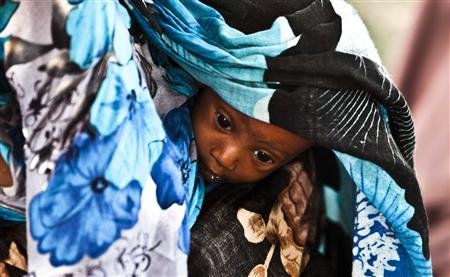Politics
Children abandoned on E Africa's 'roads of death'
Updated: 2011-07-26 08:56
(Agencies)
ROME - Desperate Somali mothers are abandoning their dying children by the roadside as they travel to overwhelmed emergency food centres in drought-hit eastern Africa, UN aid officials said on Monday.
 |
|
A newly arrived Somali refugee carries her child as they await medical examinations at the Dadaab refugee camp, near the Kenya-Somalia border. [Photo/Agencies] |
Josette Sheeran, executive director of the United Nations World Food Programme, told a conference in Rome that a combination of natural disaster and regional conflict was affecting more than 12 million people.
"We are seeing all the points able to distribute food completely overwhelmed," she said, adding that a camp in Dadaab in Kenya that was built for 90,000 people now housed 400,000.
"We want to make sure the supplies are there along the road because some of them are becoming roads of death where mothers are having to abandon their children who are too weak to make it or who have died along the way," she said.
Women and children were among the most at risk in the crisis, Sheeran said, calling it the "children's famine" given the number of children at risk of death or permanent stunting of their brains and bodies due to hunger.
The WFP will feed 2.5 million malnourished children and is trying to raise money for more, she said.
Horrible Chice
"I believe it is the children's famine, because the ones who are the weakest are the children and those are the ones we're seeing are the least likely to make it," Sheeran told Reuters.
"We've heard of women making the horrible choice of leaving behind their weaker children to save the stronger ones or having children die in their arms."
Ministers and senior officials met at the United Nations Food and Agriculture Organisation in Rome on Monday to discuss how to mobilise aid following the worst drought in decades in a region stretching from Somalia to Ethiopia, Kenya and Djibouti.
The WFP said it needed an extra $360 million in urgent funds. Oxfam said that overall another $1 billion was needed to handle the situation.
The World Bank said in a statement it was providing more than $500 million to assist drought victims, in addition to $12 million in immediate aid to help those worst hit.
Amid warnings that urgent action was required to stop a humanitarian disaster spreading across the Horn of Africa, officials said there was still a chance to support people and help them resume livelihoods as farmers, fishers and herders.
Governments worldwide and the UN have been criticised for their slow response to the severe drought but they face severe problems getting aid to a region in the grip of a raging conflict across much of southern Somalia.
The UN has declared a famine in two regions of Somalia and warned it could spread further afield.
Years of anarchic conflict in southern Somalia have exacerbated the emergency, preventing aid agencies from helping communities in the area. Nearly 135,000 Somalis have fled since January, mainly to neighbouring Kenya and Ethiopia.
The WFP has said it cannot reach more than 2 million Somalis facing starvation in areas controlled by Islamist militants, who imposed a food aid ban in 2010 and have regularly threatened relief groups.
Oxfam's Barbara Stocking said it was very difficult for staff to access parts of Somalia but it was working with local partners to provide aid and they were trying to help them scale up their support in the current crisis.
E-paper

Ringing success
Domestic firms make hay as shopping spree by middle class consumers keeps cash registers ringing in Nanjing
Mixed Results
Crowning achievement
Living happily ever after
Specials

Ciao, Yao
Yao Ming announced his retirement from basketball, staging an emotional end to a glorious career.

Going the distance
British fitness coach comes to terms with tragedy through life changes

Turning up the heat
Traditional Chinese medicine using moxa, or mugwort herb, is once again becoming fashionable
